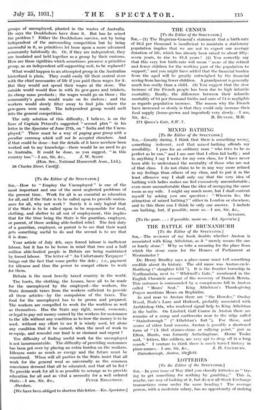[To the Editor of the SPECTATOR.]
SIR,—How to " Employ the Unemployed " is one of the most important and one of the most neglected problems of the present time. Work for all is as essential as education for all, and if the State is to be called upon to provide susten- ance for all, why not work ? Surely it is only logical that if the State is to be called upon to be responsible for food, clothing, and shelter to all out of employment, this implies that for the time being the State is the guardian, employer, or parent, of those seeking able-bodied relief. The first duty of a guardian, employer, or parent is to see that their ward gets something useful to do and the second is to see that it is done.
Your article of July 4th, says forced labour is inefficient labour, but it has to be borne in mind that two and a half million able-bodied people in Britain are being maintained by forced labour. The letter of " An Unfortunate Taxpayer " brings out the fact that some prefer the dole ; i.e., payment for idleness and thus the power to compel others to work for them.
Britain is the most heavily taxed country in the world.
The boots, the clothing, the houses, have all to be made for the unemployed by the employed—the workers, the State demands taxes from the workers sufficient to provide all these articles—by the compulsion of the taxes. The food for the unemployed has to be grown and prepared. The workers are compelled to work for the workless as well as themselves. Has the State any right, moral, economic, or legal to pay out money earned by the workers for sustenance to the idle without any condition as to how the money is to be used, without any effort to see it is wisely used, let alone any condition that it be earned, when the need of work to re-equip, and remodel our land is so clamant and urgent ?
The difficulty of finding useful work for the unemployed is not insurmountable. The difficulty of providing sustenance has been got over by placing an extra burden on the workers. Idleness costs as much as energy and the future must be considered. When will all parties in the State insist that all work for the general weal as universally as the common conscience demand that all be educated, and that all be fed ? To provide work for all is as possible to arrange as to provide education for all and as vital a necessity for a well ordered
[We have been obliged to shorten this letter.—En. Spectator.]










































 Previous page
Previous page